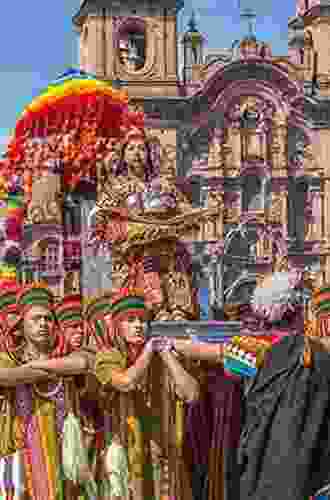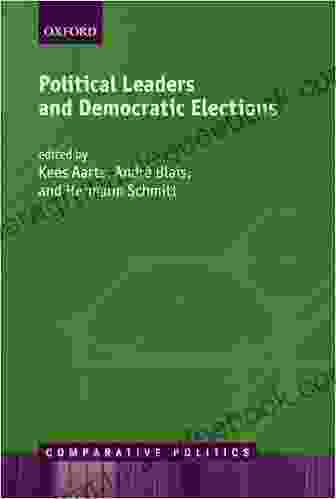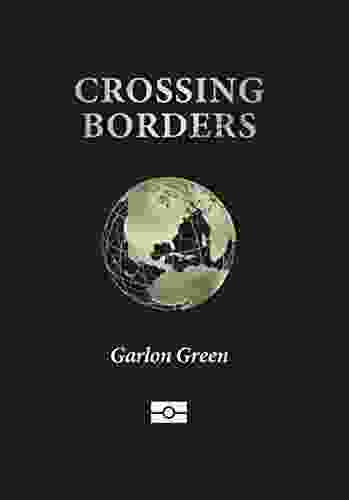Navigating the Labyrinth of Political Leadership and Democratic Elections: A Comparative Politics Perspective

The nexus between political leaders and democratic elections constitutes a cornerstone of modern governance. Understanding the intricacies of their interplay is paramount for deciphering the dynamics of political systems and the trajectory of nations. Comparative politics provides a valuable lens through which to examine this relationship across diverse contexts, revealing the nuances of leadership styles, electoral systems, and the pivotal role of citizens in shaping political outcomes.
Leadership Styles: A Tapestry of Approaches
Political leaders embody the embodiment of their nation's values, aspirations, and challenges. Their leadership styles profoundly impact the political landscape, ranging from unifying consensus-builders to polarizing populists.
5 out of 5
| Language | : | English |
| File size | : | 2541 KB |
| Text-to-Speech | : | Enabled |
| Screen Reader | : | Supported |
| Word Wise | : | Enabled |
| Print length | : | 256 pages |
| Lending | : | Enabled |
| X-Ray for textbooks | : | Enabled |
Charismatic Leaders: Captivating the Masses
Charismatic leaders possess an enigmatic charm that enchants the electorate. With oratory prowess and an aura of magnetism, they inspire fervent support and mobilize the masses. Examples include Winston Churchill, Nelson Mandela, and Barack Obama.
Technocratic Leaders: Rationality and Expertise
Technocrats prioritize technical expertise over charisma, approaching governance with a pragmatic and data-driven mindset. Their emphasis on competence and efficiency often resonates with voters seeking stability and problem-solving.
Bureaucratic Leaders: Navigating the Maze
Bureaucratic leaders are adept at navigating the intricacies of government institutions, skillfully managing complex systems. They prioritize orderliness, rule-following, and incremental policy changes.
Electoral Systems: Shaping Representation
Electoral systems dictate the rules by which citizens select their representatives. These systems vary widely, each with distinct implications for leadership selection and the responsiveness of government to the electorate.
First-Past-the-Post: Simplicity and Majority Rule
First-past-the-post systems award victory to the candidate with the most votes, regardless of whether they receive a majority. This system tends to favor two-party dominance and can lead to underrepresentation of minority viewpoints.
Proportional Representation: Reflecting Diversity
Proportional representation systems allocate seats in the legislature based on the proportion of votes received by each party. This approach promotes diversity and ensures that a wider range of political perspectives is represented in government.
Hybrid Systems: Striking a Balance
Hybrid systems combine elements of both first-past-the-post and proportional representation, seeking to balance the benefits of each. For instance, Germany employs a mixed-member proportional system that combines local constituencies with proportional representation in the legislature.
Citizen Participation: The Pulse of Democracy
The relationship between political leaders and democratic elections cannot be fully understood without considering the active role of citizens. Their involvement shapes the electoral process and holds leaders accountable to the will of the people.
Voter Turnout: A Measure of Engagement
Voter turnout rates reflect the level of citizen participation in elections. Factors such as civic education, perceived efficacy, and candidate appeal influence turnout rates and shape the legitimacy of elected leaders.
Political Protest: Voicing Dissent
When citizens feel their voices are not heard through electoral channels, they may resort to political protest. Demonstrations, petitions, and strikes serve as avenues for expressing dissatisfaction, pressuring leaders to address grievances.
Media Scrutiny: Watchdogs of the People
The media plays a vital role in informing citizens, scrutinizing political leaders, and holding them accountable. Independent and impartial journalism fosters transparency and ensures that the public has access to the information they need to make informed decisions.
Comparative Perspectives: Unveiling Similarities and Distinctions
By comparing political leadership and democratic elections across different countries, we gain a deeper understanding of the diversity and commonalities within political systems. Comparative analysis reveals:
Cultural Influences: Shaping Leadership Styles
Cultural norms and traditions influence the expectations and perceptions of political leadership. In some cultures, charismatic leaders are highly valued, while others prioritize stability and technocratic expertise.
Institutional Structures: Constraints and Opportunities
Institutional structures, such as constitutional frameworks and electoral laws, set boundaries and possibilities for political leaders. These structures influence the level of power they wield and the responsiveness of government to citizen demands.
Economic Development: A Correlation to Electoral Systems
Economic development is correlated with the prevalence of certain electoral systems. Proportional representation systems are more common in developed economies, while first-past-the-post systems are often found in developing countries.
The labyrinth of political leadership and democratic elections is an ever-evolving landscape, shaped by the interplay of charismatic figures, diverse electoral systems, and the active engagement of citizens. Comparative politics provides a valuable tool for navigating this complexity, revealing the commonalities and distinctions that define political systems worldwide. By understanding the intricacies of this relationship, we empower ourselves to participate meaningfully in the political process and hold our leaders accountable to the will of the people.
References
- Lijphart, A. (2012). Patterns of democracy: Government forms and performance in thirty-six countries. Yale University Press.
- North, D. C. (1990). Institutions, institutional change and economic performance. Cambridge University Press.
- Przeworski, A., Alvarez, M. E., Cheibub, J. A., & Limongi, F. (2000). Democracy and development: Political institutions and well-being in the world, 1950-1990. Cambridge University Press.
5 out of 5
| Language | : | English |
| File size | : | 2541 KB |
| Text-to-Speech | : | Enabled |
| Screen Reader | : | Supported |
| Word Wise | : | Enabled |
| Print length | : | 256 pages |
| Lending | : | Enabled |
| X-Ray for textbooks | : | Enabled |
Do you want to contribute by writing guest posts on this blog?
Please contact us and send us a resume of previous articles that you have written.
 Book
Book Page
Page Genre
Genre Reader
Reader Library
Library E-book
E-book Newspaper
Newspaper Shelf
Shelf Glossary
Glossary Foreword
Foreword Preface
Preface Footnote
Footnote Manuscript
Manuscript Scroll
Scroll Bestseller
Bestseller Library card
Library card Biography
Biography Autobiography
Autobiography Memoir
Memoir Reference
Reference Thesaurus
Thesaurus Character
Character Resolution
Resolution Librarian
Librarian Catalog
Catalog Card Catalog
Card Catalog Periodicals
Periodicals Study
Study Research
Research Scholarly
Scholarly Lending
Lending Reserve
Reserve Journals
Journals Reading Room
Reading Room Interlibrary
Interlibrary Thesis
Thesis Awards
Awards Reading List
Reading List Book Club
Book Club Theory
Theory Jing Jing Yang
Jing Jing Yang Will Eisner
Will Eisner Jason Tad Plinta Howard
Jason Tad Plinta Howard Arlem Hawks
Arlem Hawks Rosie Blythe
Rosie Blythe Scott Marshall
Scott Marshall Daniel B Botkin
Daniel B Botkin Stefano Calicchio
Stefano Calicchio Safia Minney
Safia Minney Jawaid Iqbal
Jawaid Iqbal Nigel Perrin
Nigel Perrin Nathan Myhrvold
Nathan Myhrvold Zen Cho
Zen Cho Nelson C Nye
Nelson C Nye Stephen J Phillips
Stephen J Phillips Nkechi Anya
Nkechi Anya Graeme Hampton
Graeme Hampton Dorothy Canfield Fisher
Dorothy Canfield Fisher Douglas M Parker
Douglas M Parker Deborah Edmisten
Deborah Edmisten
Light bulbAdvertise smarter! Our strategic ad space ensures maximum exposure. Reserve your spot today!

 Miguel de CervantesMurder at the Tower: A Spine-Tingling Family Saga that Unravels Centuries of...
Miguel de CervantesMurder at the Tower: A Spine-Tingling Family Saga that Unravels Centuries of... Nathaniel PowellFollow ·17.3k
Nathaniel PowellFollow ·17.3k Robert ReedFollow ·19.6k
Robert ReedFollow ·19.6k Jamie BlairFollow ·13.1k
Jamie BlairFollow ·13.1k Richard SimmonsFollow ·14.9k
Richard SimmonsFollow ·14.9k Edgar HayesFollow ·2.1k
Edgar HayesFollow ·2.1k Hamilton BellFollow ·18.7k
Hamilton BellFollow ·18.7k Clark BellFollow ·15.7k
Clark BellFollow ·15.7k Haruki MurakamiFollow ·16.4k
Haruki MurakamiFollow ·16.4k

 Ricky Bell
Ricky BellThe Marriage: An Absolutely Jaw-Dropping Psychological...
In the realm of...

 Ray Blair
Ray BlairDiscover the Enchanting Charm of Budapest and Its...
Nestled in the heart of...

 Tyrone Powell
Tyrone PowellHuddle: How Women Unlock Their Collective Power
Huddle is a global movement that empowers...

 Grayson Bell
Grayson BellThe Coin Story of the Holocaust: A Symbol of Hope and...
In the depths of the...

 Virginia Woolf
Virginia WoolfFolklore Performance and Identity in Cuzco, Peru: A...
Nestled amidst...

 Dylan Mitchell
Dylan MitchellThe Enduring Love Story of Héloïse and Abélard: A Tale of...
An Intellectual Passion In the heart of...
5 out of 5
| Language | : | English |
| File size | : | 2541 KB |
| Text-to-Speech | : | Enabled |
| Screen Reader | : | Supported |
| Word Wise | : | Enabled |
| Print length | : | 256 pages |
| Lending | : | Enabled |
| X-Ray for textbooks | : | Enabled |










